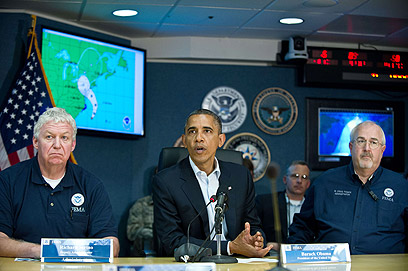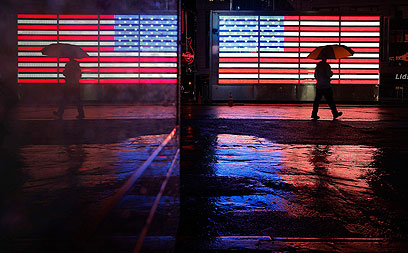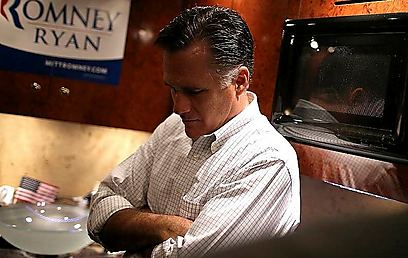

A tense and unpredictable race for the White House became even more so on Monday, as mammoth storm Sandy created delicate political challenges for President Barack Obama and Republican rival Mitt Romney and raised the possibility of a chaotic voting process.
As the deadly storm barreled ashore on the paralyzed East Coast, the presidential campaign went into what amounted to a deep freeze just when Obama and Romney had planned to launch their final push for votes in the November 6 election.
Related stories:
- Obama explains why he didn't visit Israel
- Superstorm Sandy slams into East Coast
- Obama says election comes down to trust
Suddenly, the final eight days of what has been a bitter fight for the hearts of voters in a politically divided electorate has become a test of crisis leadership for Obama - and a time when harsh political rhetoric seems out of line.
Both sides promised to put aside politics to deal with the fallout from the storm. But privately, they fretted about the storm's potential impact on a week of candidate appearances and door-to-door campaigning by volunteers that is so crucial in get-out-the-vote efforts.
There also is concern about the impact on early voting - a priority for both campaigns but especially Obama's - and Election Day itself, if predictions that millions of people and their polling precincts could be without power well into next week come true.
The crisis gives Obama, who as president is chiefly responsible for the government's response to the storm, an opportunity to show the presidential leadership that Romney frequently accuses him of lacking.
- For full coverage of the US elections click here
If Obama is seen as falling short, the memory of the political damage suffered by then President George W. Bush and his Republicans over the government's botched response to Hurricane Katrina in 2005 is a haunting reminder of the consequences.
On the other hand, a strong effort by Obama's White House in responding to the storm could provide a positive, lasting image to Americans as they head to the polls next week – assuming polling places will have power and be open.
Obama canceled campaign rallies planned for Monday and Tuesday and returned to the White House from Florida to meet with federal emergency officials.

Obama during Sandy briefing (Photo: Reuters)
Romney's team, after initially making plans to continue campaigning, apparently reconsidered and announced late Monday morning that the former Massachusetts governor would cancel a rally in Wisconsin on Monday night, and its schedule on Tuesday as well.
Romney joined Obama in appealing for donations to the Red Cross and offered sympathy for those in the storm's path.
For Romney, the hurricane threatens to sideline him for precious days in the campaign's final week, disrupting his efforts to cast himself as the candidate with momentum in the presidential race.
It also forces the Republican challenger to walk a fine line when considering whether to launch political attacks against Obama as the president deals with a crisis.
And if the government's response to the storm is broadly deemed a success, it could be a stark reminder that Romney has advocated dramatically cutting back funding for federal relief agencies, saying that such duties should be shifted to the states or perhaps the private sector.

Early voting disrupted (Photo: AP)
"This throws a monkey wrench into the campaign for both sides," Republican strategist Ford O'Connell said. "Nobody wants to look political in the middle of a crisis."
Without official duties to carry out, Romney could be relegated to visiting local relief centers while trying not to hinder rescue workers. Romney's running mate, Wisconsin congressman Paul Ryan, told supporters at a Florida rally on Monday that the campaign would turn its attention to helping those affected by the storm.
In contrast, Obama can use the full power of the presidency to issue directives and announcements, and play the role of sympathizer-in-chief – as he did on Monday, when he appeared in the White House briefing room to announce storm preparations and urge those in Sandy's path to take cover.
"I'm not worried at this point about the impact on the election," Obama said in response to a reporter's question about the campaign. "I'm worried about the impact on families, and I'm worried about our first responders."
States oversee elections
The storm already has disrupted early voting in several states - including Virginia, one of eight or so key battleground states in the presidential race.
But as the scope of the potential damage from Sandy became clear on Monday, there was speculation over whether Election Day voting could be affected, and whether voting might be prolonged to allow people to get to the polls.
Federal Emergency Management Agency (FEMA) Administrator Craig Fugate said there could be a lingering effect on Election Day, and he promised the agency would help any state requesting it. He said FEMA was examining how much it can pay to help rebuild any polling stations destroyed in the storm.

Mitt Romney (Photo: AFP)
It would take an act of Congress to change the election from its legally prescribed date: The first Tuesday after the first Monday in November.
But because the details of carrying out US elections are left to the states, any decisions on whether to extend voting hours for the election would more likely be made on a state-by-state basis.
That creates the potential for uneven responses to any disruption in voting - and the possibility that state politics could affect such decisions.
Sandy's impact could be greater in rural areas, where Romney generally is more popular than Obama. Power typically is restored more quickly in cities, urban roads are less likely to stay blocked by flooding or downed trees and residents are more likely to be able to walk to their polling places.
In theory, a state could bypass the public altogether and have its legislature choose the "electors" who decide who the state will back for president. The U.S. Constitution does not mandate that electors are chosen by popular vote.
A Democrat-controlled state, such as Massachusetts or Maryland, could pick electors to support Obama.
But a state's Republican-controlled legislature - such as in Ohio or in Virginia, where Governor Bob McDonnell is co-chairman of Romney's campaign - could ensure its votes went to Romney.
This scenario worries some Democrats, who note that Florida, which decided the bitterly contested 2000 election, was governed by Jeb Bush, brother of Republican George W. Bush, who won the presidential race despite losing the popular vote by half a million votes.
- Receive Ynetnews updates
directly to your desktop















